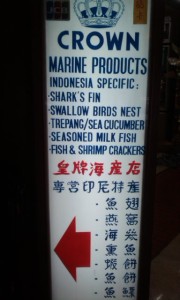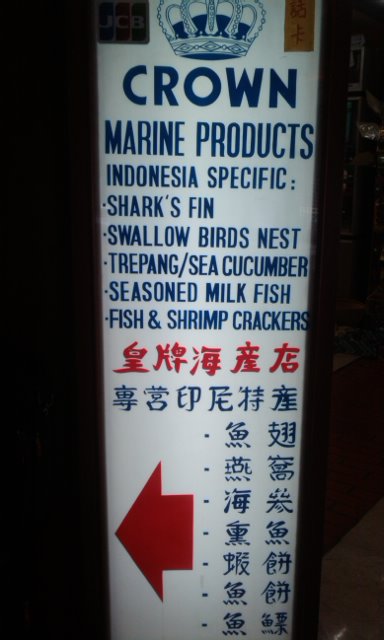While waiting for a flight in Jakarta today, I took a stroll around the airport. As I walked through the terminal, this sign stopped me in my tracks.

Shark fin shop at Jakarta airport
Walking into the shop I was confronted by row after row of dried shark fins, some costing as much as 1000 USD.

Shark fins on display
My emotions turned quickly from shock, to anger, to disbelief that nothing was being done by the numerous airport officials walking past.
Then I paused, and questioned my own response.
- Shark finning is not illegal in Indonesia. In fact there is no regulation governing shark fisheries at all.
- The sale of shark fin or related products is not regulated in Indonesia.
- Many cultures throughout the world have traditionally used shark products.
- In fact, many of us use shark-derived products every day in pharmaceuticals and cosmetics.
So when I saw these shark fins for sale in an international airport, why was I so shocked? As a diver and a marine scientist, I have a deep affinity for the ocean and its creatures. But mine is not the only perspective.
For the fisherman who caught these sharks, the fins represent a livelihood, an income, and a source of food for him and his children.
For the shopkeeper too, selling shark fins is a livelihood. He supplies a demand within the boundaries of the law, but does that means he has an obligation to police environmental ethics?
For the buyer, shark fins may be a cultural tradition and perhaps even a right.
Can these different perspectives be reconciled? Each one of them is after all correct.
Some divers and ocean lovers have their own stories of dwindling shark populations. Many have witnessed the changing state of our oceans first hand. And most recognise that there is a problem. The demand for shark and ray products is too great for the natural rate of supply to keep pace.
So is a total ban on shark fishing the answer?
Is it morally right to deny a fisherman his livelihood, a shopkeeper his job, and a customer his cultural heritage.
Or is fisheries management the answer? With catch quotas, licenses or other techniques to ensure harvests can be maintained at sustainable levels.
Indeed, is it even possible to manage shark fisheries sustainably? With a long life-cycle and low fecundity, sharks are not well suited to targeted harvesting. Furthermore management planning is hindered by a shortage of scientific knowledge about sharks and rays.
Watching a young boy examining the shark fins with his grandmother, I struck by the complexity of these environmental, social and economic issues, and the philosophical and moral questions they present.
What should be done about shark fisheries? Share your thoughts in our poll, or have your say in the comments below.


